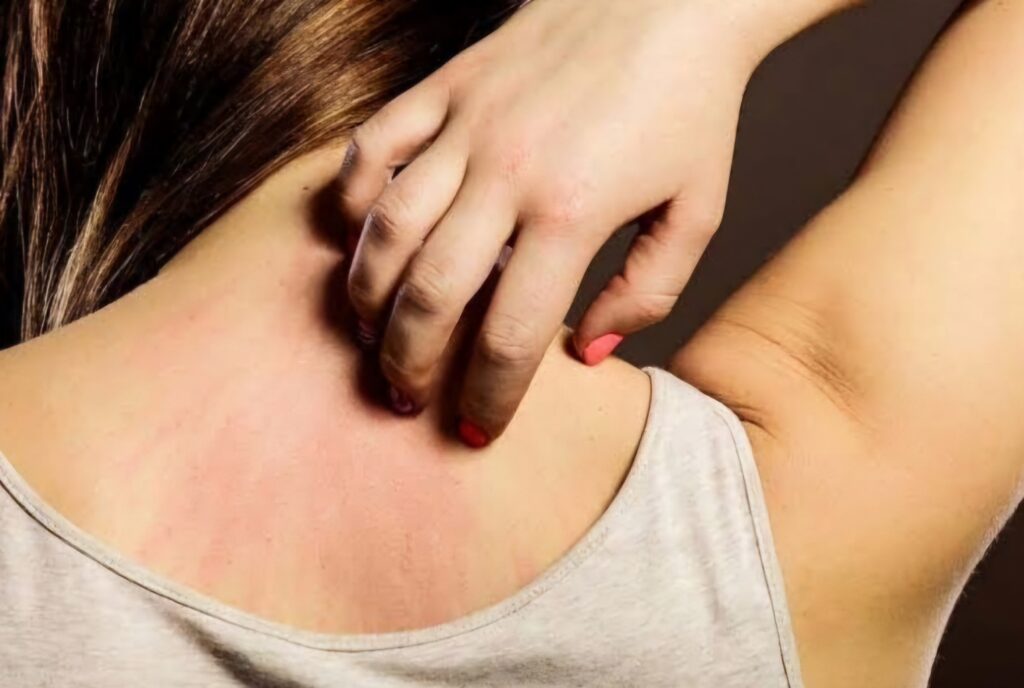Why Allergies May Occur:
- Increased Humidity:
- The monsoon season brings higher humidity, which can promote the growth of mold, fungi, and dust mites, all of which can trigger allergic reactions in sensitive individuals.
- Pollen:
- Certain plants may release pollen during the monsoon, contributing to airborne allergens.
- Food Allergies:
- Changes in diet during the monsoon, including the consumption of certain seasonal foods, might provoke food allergies, leading to symptoms like vomiting or gastrointestinal discomfort.
- Weakened Immune System:
- People with diabetes often have a weakened immune system, making them more susceptible to infections and allergies.
- Infections:
- Warm, moist conditions during the monsoon can lead to fungal and bacterial infections, particularly in people with diabetes who are prone to skin issues.
Symptoms of Allergies:
- Skin Rashes and Itchiness:
- Allergies can cause hives, rashes, or eczema, leading to itchy and irritated skin.
- Gastrointestinal Symptoms:
- Vomiting, nausea, and diarrhea may occur if an allergen is ingested.
- Respiratory Symptoms:
- Sneezing, coughing, runny or stuffy nose, and wheezing are also common allergic reactions.
Managing Allergies in Diabetes:
- Identify Allergens:
- Keep track of foods, environmental factors, or activities that seem to trigger symptoms and try to avoid them.
- Consult a Doctor:
- A healthcare professional can perform allergy tests and provide specific advice or medications to manage symptoms.
- Maintain Good Hygiene:
- Regularly wash hands, keep your environment clean, and avoid damp areas to reduce exposure to allergens.
- Use Antihistamines:
- Over-the-counter antihistamines may help alleviate mild allergic symptoms. Always consult with a doctor before taking any medication.
- Stay Hydrated:
- Drinking plenty of water can help flush out toxins and support overall health.
- Monitor Blood Sugar Levels:
- Allergies and related medications can affect blood sugar levels, so it’s important to monitor and manage diabetes carefully.
- Skin Care:
- Use hypoallergenic skincare products and keep the skin moisturized to prevent dryness and irritation.
- Dietary Adjustments:
- Avoid known allergens and focus on a balanced diet to support immune function and overall health.
When to Seek Medical Help:
- Severe Reactions:
- If you experience difficulty breathing, swelling, or severe vomiting, seek emergency medical help immediately, as these could be signs of a serious allergic reaction or anaphylaxis.
- Persistent Symptoms:
- If symptoms persist despite taking precautions, consult a healthcare provider for further evaluation and treatment.
Conclusion:
While allergies can be bothersome, especially for individuals with diabetes, proper management and preventive measures can help reduce their impact during the monsoon season. If you suspect allergies, it’s always best to consult with a healthcare professional to tailor a management plan suited to your specific needs.
If you find this article helpful do like 👍 and share with your friends !
Dr. Nikhil Prabhu ( Diabetes Specialist )
Dr Nikhil Prabhu is a consultant Diabetologist from mumbai. he has been practicing for more than a decade and currently over 15000+ patients are under his treatment for diabetes and thyroid disorders from India and abroad | you can book his appointment for tele-consultation via video call on 9082523295/9870916962 | follow us on YouTube , insta , FB & Linkedin for more diabetes & health related tips







